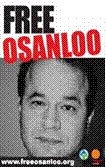28 July 2009
The human rights crisis in Iran is deepening daily and next week’s expected inauguration of Mahmoud Ahmadinejad for a second term as president may spark further protests and a massive new clampdown, warned Irene Khan, Amnesty International’s Secretary General, and Iranian Nobel Peace Prize Laureate Shirin Ebadi today.
“Three days ago, thousands of people in over 100 cities across the world joined in a Global Day of Action in protest at the numerous arrests, beatings and killings that have accompanied the Iranian authorities’ attempt to force through the declared election result, which is so widely disputed,” said Irene Khan. “The purpose was to express our solidarity with those whose rights are being violated in Iran, and to send a message to Iran’s Supreme Leader and those about him that the violations must cease. The world is watching.”
Shirin Ebadi, Iran’s most distinguished lawyer and human rights defender, is in London at Amnesty International’s invitation.
An organization that she founded in 2001, the Centre for Human Rights Defenders (CHRD), was summarily shut down by the Iranian authorities last December because of its efforts to promote human rights and defend people who were detained and tortured. At least three of its leading members – journalist Abdolreza Tajik as well as Abdolfattah Soltani and Mohammad Ali Dadkhah, both leading human rights lawyers – have been detained since the start of the election-related protests. Two of them are held in Tehran’s notorious Evin Prison, but the whereabouts of Mohammad Ali Dadkhah is unknown, raising particular fears for his safety.
“My colleagues have been rounded up because of their work to promote justice and the rule of law, and to defend the human rights of people in Iran,” said Shirin Ebadi, who was awarded the Nobel Peace Prize in 2003. “They are now languishing in jail like so many others in my country because they stand up for universal values – the rights to freedom of opinion and expression and to register one’s protest peacefully without fear of arrest or attack by strong-arm forces like the Basij.”
Irene Khan and Shirin Ebadi cautioned that international attention and efforts must not fade, however intransigent the authorities in Tehran appear.
“People in Iran need international support now more than ever as the political divisions in Tehran play themselves out,” said Shirin Ebadi. “International attention and pressure must be sustained and intensified if it is to have impact on those calling the shots in Tehran.”
“In particular, the UN needs to play a more determined and decisive role,” said Irene Khan. “Through its human rights and other mechanisms, the UN must investigate the violations taking place in Iran and compile evidence that can be used, one day, to bring those responsible to account.”
Shirin Ebadi is visiting London as part of international efforts to highlight human rights abuses in Iran and to support a worldwide action that Amnesty International is launching in defence of the CHRD and its members, and to demand that it be allowed to reopen and continue its work.


